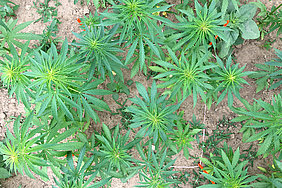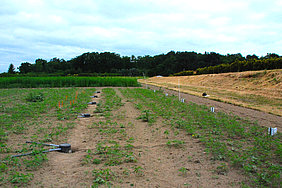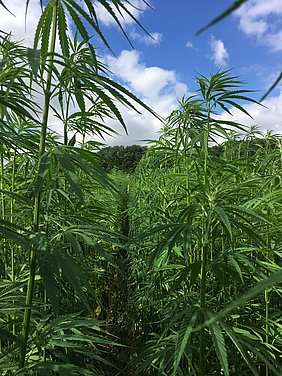Scientists of the Leibniz Institute for Agricultural Engineering and Bioeconomy in Potsdam have assessed water productivity as a measure of water use efficiency for hemp fibre plants. Results from the dry year 2018 indicate that hemp plants use water for biomass production about six times more efficiently than cotton. The study has recently been published in the scientific journal Water.
Three consecutive years of poor rainfall in Germany have sharpened the focus on the availability of water for agricultural production. Facing climate change, there is a growing call for a sustainable agriculture that enables a more careful use of this scarce resource. This also means substituting plant species with high water needs by those that are able to get more out of every drop of water.
In this respect, hemp (Cannabis sativa L.) is a promising option. Formerly, hemp was widely used for fibre production globally, but has been almost completely replaced in the last century, first by cotton and subsequently by synthetic fibres. Cotton cultivation, however, is associated with a high water demand of at least 750 mm from precipitation or irrigation water per vegetation period, frequently resulting in soil salination, and an intensive use of pesticides. Hemp, on the other hand, is a high-yielding multi-purpose plant that is comparatively undemanding in terms of plant protection and fertilisation.
The water use of hemp plants during the growing process has been little understood so far. Thus, ATB scientists have investigated the water productivity of two hemp cultivars in a field trial. The cultivars 'Santhica 27' and 'Ivory', adapted to Central European growing conditions, were chosen based on results of the MultiHemp project which ended in 2017. Investigations were carried out at the ATB research site Marquardt in the northwest of Potsdam - one of the driest growing areas in Germany with an average annual rainfall of 579 mm. Groundwater table depth is 10 m below the top ground surface, the sandy soil has only limited storage capacity for water and nutrients. The 2018 growing season from May to September was extremely dry, with only seven days of low rainfall ranging from 0.7 to 19.6 mm. To safeguard the establishment of the experiment after germination, the plants were irrigated during the emergence phase.
For the study, in addition to meteorological data, water availability from the soil, transpiration and volumetric water content, plant architecture, leaf area index and plant physiological parameters such as gas exchange, photosynthesis and reactions to environmental impacts were measured regularly. A new type of measuring set-up was used to determine throughfall, i.e. the amount of precipitation that penetrates the leaf canopy.
In calculating water productivity, i.e. the relationship between water consumption and the build-up of dry matter, all components of water inflow via air and ground used for plant growth were included. The total biomass yield and the fibre-containing bast fraction were determined immediately after the harvest in September.
The results indicate that with 2.4 kg dry matter per cubic metre of water used on average, the water productivity of industrial hemp is six times higher than the water productivity of cotton (0.4 kg / m3).
„As we can see, hemp offers great potential for being cultivated under relatively dry conditions. This together with the lower demands for plant protection measures make fibre hemp interesting as an environmentally friendly alternative to cotton", concludes Dr. Hans-Jörg Gusovius, expert for fibre plants at ATB. "The THC-free Cannabis cultivars used in our study were specially bred for growing conditions in Europe. They are ideal for cultivation on semi-dry sites."
„The findings of our study reflect the 2018 conditions for hemp production at one location," summarises Dr. Katrin Drastig, hydrogeologist at ATB. In view of the expected climatic scenarios, there is still a considerable need for research to further improve the efficiency of water use in agriculture at farm level. "We need much more data such as these individual results to derive models for specific regions, management practices and crop species. This would allow us to help farmers in the future to optimise water use efficiency at their farms ", she concluded.
ATB conducts intensive research on the extraction and processing of fibres, not only from traditional fibre plants such as hemp, flax and nettle. From a sustainability perspective, the focus of research is shifting to fibre extraction from the coupled and residual use of food and feed crops such as hops, oil flax or sorghum. These multifunctional plants can provide high-quality fibres for the bio-economy where they can substitute fossil raw materials, e.g. in composites, as construction or insulation materials.
The Leibniz Institute for Agricultural Engineering and Bioeconomy (ATB) researches at the interface of biological and technical systems. Research aims to provide the basis for sustainable bio-economic production systems. For this purpose, ATB develops and integrates new technologies and management strategies for a knowledge-based, site-specific production of biomass and its use for food, as bio-based products and energy sources - from basic research to application.
Original publication:
Drastig, K.; Flemming, I.; Herppich, W.; Gusovius, H.: Study of water productivity of industrial hemp under hot and dry conditions in Brandenburg (Germany) in the year 2018. Water 11 (12): 1-21, 2020. https://doi.org/10.3390/w12112982
Publication in this context:
Herppich, W.B., Gusovius, H.-J., Flemming, I., Drastig, K.: Effects of drought and heat on photosynthetic performance, water use and yield of two selected fiber hemp cultivars at a poor-soil site in Brandenburg (Germany). Agronomy 2020, 10, 1361, 2020. https://doi.org/10.3390/agronomy10091361
Please find further information on this topic also on our Youtube channel "Stream from the ATB-Fieldlab: Optimising cherries, using hemp fibres" (from minute 28 on):
https://www.youtube.com/watch?v=fZo9T0M_yes
Contact:
PD Dr. Katrin Drastig – WG leader Water Productivity in Agriculture (AgroHyd)
Tel.: +49 (0) 331 5699-218, Email: kdrastig@atb-potsdam.de
Dr. Hans-Jörg Gusovius – WG leader Process Engineering for Fibre Plants
Tel.: +49 (0) 331 5699-316, Email: hgusovius@atb-potsdam.de
Dr. Werner B. Herppich – Senior Scientist, Dept. Horticultural Engineering
+49 (0) 331 5699-620, Email: wherppich@atb-potsdam.de
Helene Foltan - Communication, Public relations
+49 (0) 331 5699-820, Email: presse@atb-potsdam.de



